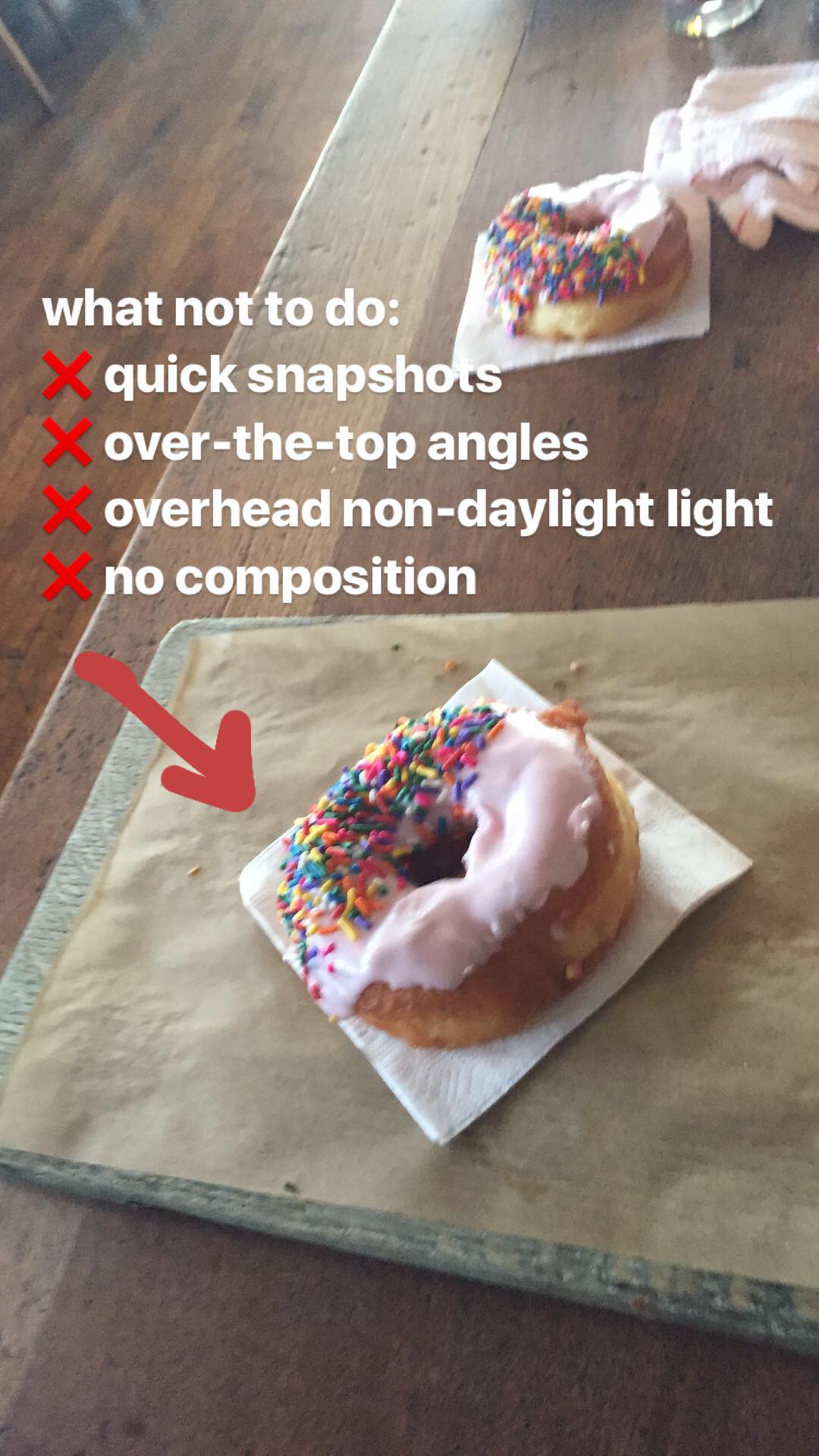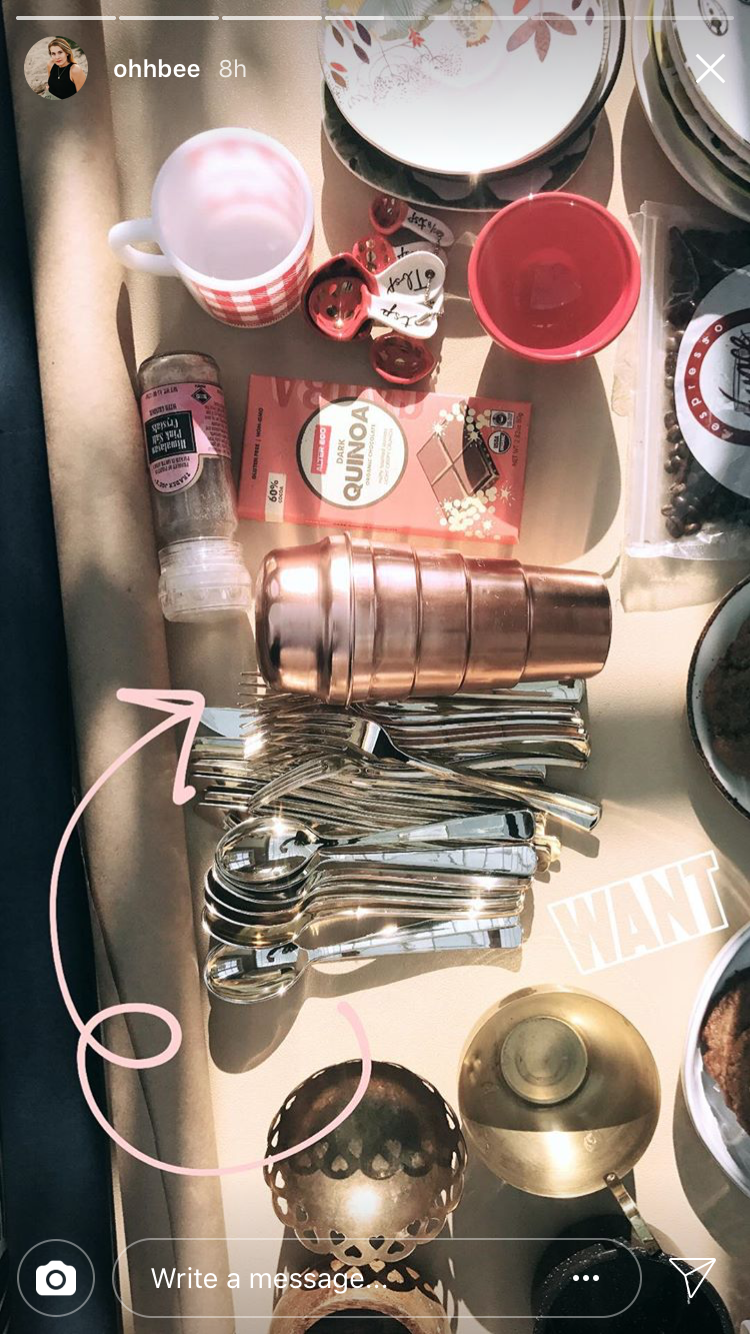what i learned from teaching for a year
I didn’t intend to spend all of 2017 teaching classes. It wasn’t really in the realm of possibility for me - I’ve always been bad at public speaking, I’ve never taught before, and although I do have a studio art degree, I still taught myself a lot of what I know today.
But I was lucky enough to start the year out with the most perfect opportunity for me specifically. A local arts space had a food photography class that the teacher had to cancel on at the last minute, and a friend recommended me to do it.
All the pressure I felt to teach wasn’t really there - I was filling in for someone else, so if I messed up I wouldn’t feel responsible. The lesson plan was entirely up to me. The subject was something I actually felt like I had some expertise in. And the class size was really small - just six people. So I had to go for it. The only downsides for me: all the students already knew a bit about photography (would they ask me hard technical questions??) and it was a six hour intensive workshop. (Six hours tho??)
It was the first hard push I gave myself in 2017, and I’m so, so, so glad I did it. It gave me the confidence to say yes to a lot of amazing opportunities that filled the rest of my year with challenges and great experiences.
What I taught:
- one six-hour intensive food photography workshop
- styling for social media class at the george eastman museum
- social media photography for an audience of 150 people
- a collab class with Sarah from The Pastiche on styling for social media for food professionals
- a food photography & styling workshop at Upstate Social Sessions
- two photography & styling for social media classes
- two natural light photography classes
- two food photography & styling classes
- one class on using your DSLR
- one class on editing & retouching photos
Here’s what I learned from my deep dive into teaching, as a high-anxiety, fear-plagued, impostor-feeling sensitive person.
Prepare, prepare, prepare. Overprepare.
Before the first class I taught, I planned and worked for weeks - from the research I did, to the actual format of the workshop, to all the demos we would do together, to all the food I had to prep beforehand, to all the props and backgrounds and tools I’d have to bring to make it all work. The night before, I ran through the whole text I wrote, seeing how long it would take me to finish, trying to gain courage as I spoke.
When I actually got there, I was glad I was almost too prepared. I was shaking and I could hear my voice shaking as I started. (I was so grateful I had Rachel there to assist me - both in demos and emotionally.) If I didn’t have an outline and full text there to help me, I don’t know how I would’ve made it through the six hours. After the first demo, I didn’t feel like I needed the text assistance as much, but it was great to have it there.
Before each of the classes, no matter how long or short, I had a full script written, just in case. I made sure to have too many props, too much food, etc., just in case - and then in the last few classes I’ve done, I’ve scaled it back as I’ve gotten more confident and my lesson has gotten more focused.
It was crucial for me to take each one too seriously, but that’s because I lose my train of thought and get frazzled really easily. If that’s you, I would take this lesson to heart.
More content doesn’t mean more learning.
I’m currently researching bringing my photography classes online, and the competition is fierce. A lot of them tout hundreds of hours of video lessons for less than $100 - something I don’t think I could do. But ultimately, does hundreds of hours actually add value? Do students actually finish courses that run in the hundreds of hours? Could I teach someone something in a few hours in a concise way that would rival that? When I look to the teachers and professors I learned the most from, I think of just a few moments of clarity where their explanations all fell into place and I just “got it.” I’m certain there are plenty of theories on this from actual teachers, but I feel like I’m going to try to keep it as short & smart as I can, going forward.
Questions bring clarity.
I’m terrified of questions, especially online. I kind of dread looking through Chickpea’s social media questions. So for me to field questions at a place where I’m already scared, I was expecting the worst. I was scared of technical questions, in an industry that thinks that women don’t understand technical elements. (In all honesty, I don’t understand most of it, but I researched heavily and then tried to answer in ways that would make practical sense.) But 1) they weren’t that hard to answer, because I overprepared, and 2) those questions helped focus my lesson plans in a way that made them better, and it helped me learn SO much along the way. So I thank the questions, and now I’m a little less scared to hear them.
Mastery comes from having to teach someone else how to do what you do.
Being someone who is obsessed with long, complex board games, and loves to push them on friends, I’ve already learned that teaching others helps you get better at those games. To explain it to someone else, you have to know the small details, the rules, the strategies, and what the overall goals are - that way, you can generalize it or go into detail as you see fit.
The same goes for teaching anything, I think. Being knowledgable is great, but there are many points that you might not have thought of, or perspectives you might not have considered. If you just know how something works by experience, but can’t explain it, do you really know it? I’ve learned so much by teaching those unexplainable things to others.
Tailor your message to your audience.
Before each class, whenever possible, I tried to ask everyone what their experience is and what their goals are. Someone who’s there to take better photos of their kids for an album has different priorities than someone who wants to make money from high end food blogging.
Same goes for the length and size of the class. I tried my best to simplify for shorter classes, or theme them based on the audience. For the Becoming Boss panel I was on, I did a 15 minute session by myself in front of 150 people - this was probably the scariest thing I did all year. Sarah from Rocgirlgang suggested that I focus it down that way it’d work for a big crowd, so instead of a more in-depth class on social media photography, I did it just on 10 things to avoid when shooting for Instagram. That, compared to the six hour class with six people where we did multiple long active demos, showed me how important tailoring is.
Always keep updating your message.
My section on photo editing at my first class is very, very different from what it is now. Before every class, I like to go through and update my notes, text, slideshow, and handout to incorporate any important information I might’ve learned between classes. (And I’ve been spending the year very deliberately learning as much as I can, to make my classes better.)
Same goes for the demos I do. At the beginning I tried to bring lots of props and let everyone style their own setup, but now I’m doing more elaborate, well-conceived demos that I put together as I explain the concepts, then we all shoot together. This simplified it for me, and I think the students were more focused on the information and less on styling something “wrong” by themselves. I found it invaluable to keep changing my lessons as I went along - not only did it get better, but experimenting helped me find better ways to teach.
Besides strengthening my knowledge of photography, opening me up to be better at public speaking, and teaching me how to be more confident, these classes were also just fun to do. I'll be doing a few more for sure in 2018, but I'm most interested in doing an online version for Chickpea - it'll be another push forward for me.
If you're looking to expand your view into teaching, definitely give it a try through Skillshare, making an ebook, or do it locally like I did. (In Rochester, give The Brainery a try!) It was an experience I've loved doing.







































